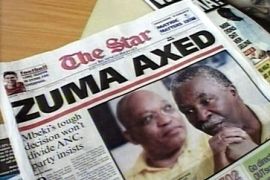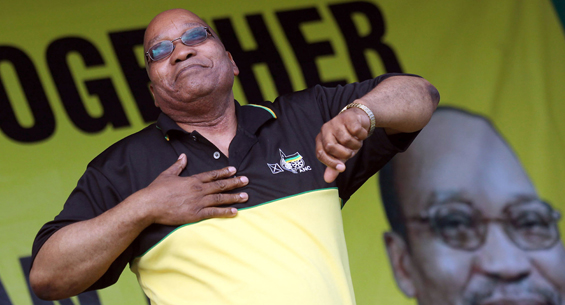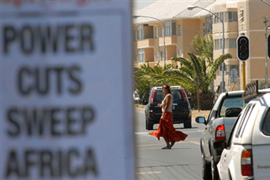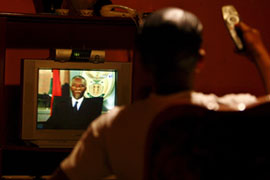South Africa’s media freedom fight
Accusations of intimidation of the press as 23 million voters head to the polls.

 |
| Politicians have been accused of being intolerant to criticism and attempting to push through legislation which would clamp down on media freedoms and constitutional rights [AFP] |
Political parties typically want more, rather than less, media coverage in the lead up to parliamentary elections.
However, both Jacob Zuma, the leader of the African National Congress (ANC) and presidential candidate, and South Africa’s political system itself are atypical democratic entities.
Recently Zuma decided to sue the UK’s Guardian newspaper for defamation over an article published in March. Meanwhile, the state-owned South African Broadcasting Association (SABC) pulled a documentary on political satire because, it is widely believed, of pressure from the ruling ANC over content besmirching the party.
Naysayers of South Africa’s free and liberal democracy, often hailed internationally as a beacon among Africa’s failed states, appear bolstered.
‘With us or against us’
Jane Duncan, executive director of the Freedom of Expression Institute based in Johannesburg, believes that such moves are part of a long-term and increasing intolerance of criticism in South African politics.
 |
| Critics have said that leaders have gone too far in trying to stop negative coverage [AFP] |
“I definitely think that there are elements within the ANC and government who are trying to limit media freedom. And I think that it has actually been a fairly long-term trend,” she says.
“It is definitely emanating from the ruling party that has then trickled into the executive arm.”
One senior executive at a major South African newspaper says politicians’ aversion to criticism has precipitated a wider divide both within the ANC and in the country.
“Increasing at the moment is this sentiment that you are either with us or against us,” the executive said.
“It just smacks of [former US president] George Bush all over again, and it is this awful need for – not unity, or justice – but for vengeance with this new Zuma crew.”
Zuma elicited an apology from the Guardian over rape and corruption claims.
The ANC chief strongly denies all the allegations contained in the article which ran under the headline ‘Get used to a corrupt and chaotic South Africa. But don’t write it off.”
Limiting legislation
However, the article is but a scrap of paper in the rubbish bin of negative coverage Zuma has received, from both within and outside South Africa.
| South African election 2009 |
|
|
The majority of Zuma’s bad press has followed his acquittal on rape charges in 2006, the ousting of his rival Thabo Mbeki as president last year and the dropping of corruption charges against him in April 2009.
However, Zuma continues to fight back, for instance, by suing South Africa’s Sunday Times for 7m rand (US$780,000) for publishing a cartoon of him preparing to rape a figurative Lady Justice.
The media executive quoted earlier, says politicians’ attempts to protect their reputations have now gone too far, with the ANC trying to use legislation to control the media.
Earlier this year the ANC-proposed film and publication amendment bill was rejected by parliament over concerns that it was unconstitutional, as freedom of the press and freedom of expression are protected in statute.
A protection of information bill has also been mooted which Thebe Mabanga, a parliamentary correspondent for the Financial Mail, says would allow the government to “decide anything and everything that is classified and that can be published”.
“So far, they have not been able to pass this legislation because the media has been able to argue that it would compromise their freedom,” Mabanga says.
The ANC has also proposed establishing a media tribunal, a watchdog on top of the Film and Publication Board, Broadcast Complaints Commission and Press Ombudsman, which would be under the control of an, at present, ANC-dominated parliament.
This would act as an appeals tribunal for complaints at the press ombudsman, and Mabanga believes it would be “a more powerful body, designed to reign in the press”.
‘Heightened sensitivity’
Freedom House, a non-governmental organisation that researches democratic freedoms, said in a 2008 report that the use of interdictions and gag orders by both governmental and non-state actors had risen in recent years.
|
“The message that is being sent from the top, from the very top, is that the media are anti-transformation, they are anti-revolutionary, and because of that it is open season on the media“ Jane Duncan, executive director, Freedom of Expression Institute |
They cite the Mail and Guardian newspaper being prevented by a high court from publishing information about alleged corruption at the SABC.
The report also says that government members and political figures show a heightened sensitivity to media criticism, with some accusing journalists of working against the state.
The opposition Democratic Alliance (DA) and the Congress of the People (Cope) have also accused the ANC of attempting to pressurise the media, the former telling Al Jazeera that they were particularly unhappy with biased reporting by the SABC.
“The ANC attempts to exert its influence over the media by using the force of its authority as the ruling party,” Julia Frielinghaus, head of research at the DA, said.
“It has, so far, backed away from overt control.”
However, Steyn Speed, an ANC communications manager, says the problem is that the media is not diverse enough in terms of ownership and audience.
Speed claims this limits South Africans’ right to freedom of expression, as a relatively small section of the population’s interests and views are reflected in the media.
“So for us, the challenge is really to try and encourage diversity,” he says.
“We would argue that there’s not enough critical thought in the media, that often makes it a herd mentality, and I think that undermines the quality of coverage of government and of politics in general.”
‘Political strategy’
The media tribunal was proposed following the desire for the “upmost regulation of the media”, Speed says, adding that the ANC “wouldn’t want to put in legislation that diminishes [freedom of information] in the constitution”.
 |
| Negative reporting against Zuma has grown after events such as Mbeki’s ousting [EPA] |
Duncan disagrees: “The political culture has been one of growing hostility towards free and independent media, and that now has been transformed into a strategy.
“I think the message that is being sent from the top, from the very top, is that the media are anti-transformation, they are anti-revolutionary, and because of that it is open season on the media. And if that is the kind of message that is coming from the top, it is inevitable that this will trickle down to all levels of government including the local level.”
Duncan points out that regional media are particularly vulnerable to threats from parochial politicians and businessmen who can withdraw advertising revenue in response to adverse coverage.
However, the ANC’s Speed stresses that “the media in South Africa are free to report on what they wish in the manner they wish”.
“Where we think we have been treated unfairly, we won’t be shy to say so. Where we think the media is biased, we will point that out,” he says.
“And I am sure the media will do their own fair share of criticism.”
 A guide to S Africa’s election system
A guide to S Africa’s election system